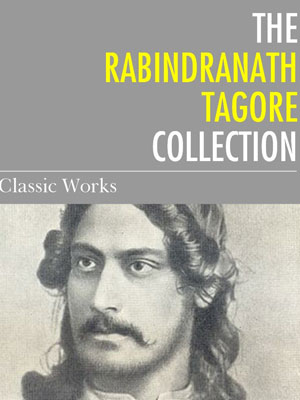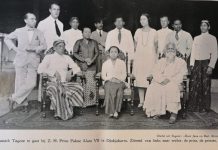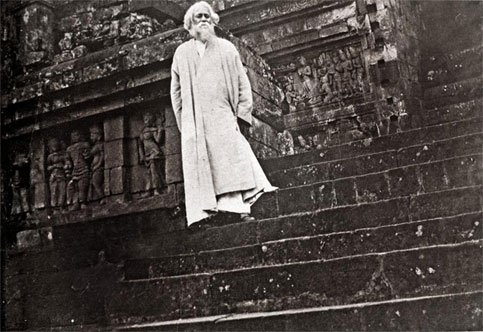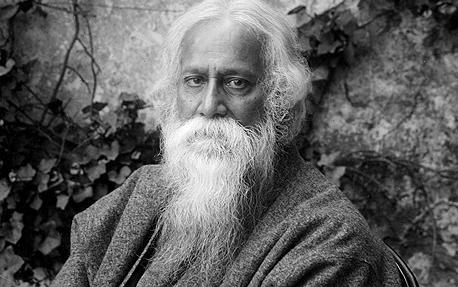 Preamble: While Tagore was an embodiment of supreme dignity, spirituality and aesthetics, his mobility between that height and the mundane, including very refined practical jokes, was indeed amazing. I am tempted to refer here quite elaborately to Maitrayee Devi’s ‘Tagore By Fireside’ (a translation by herself of her original book in Bengali ‘Mangpute Rabindranath’ i.e.’Rabindranath at Mangpu’, a hill station near Darjeeling which was the workplace of her husband) based on her diary she maintained while Tagore was her guest intermittently between 1938 and 1940. Her book is a unique literature of its kind. In no other writing one gets the poet so closely as in this book, through the eyes of Maitrayee Devi. The undernoted incidents/quotes from this book will hopefully be found relevant to the following three poems.
Preamble: While Tagore was an embodiment of supreme dignity, spirituality and aesthetics, his mobility between that height and the mundane, including very refined practical jokes, was indeed amazing. I am tempted to refer here quite elaborately to Maitrayee Devi’s ‘Tagore By Fireside’ (a translation by herself of her original book in Bengali ‘Mangpute Rabindranath’ i.e.’Rabindranath at Mangpu’, a hill station near Darjeeling which was the workplace of her husband) based on her diary she maintained while Tagore was her guest intermittently between 1938 and 1940. Her book is a unique literature of its kind. In no other writing one gets the poet so closely as in this book, through the eyes of Maitrayee Devi. The undernoted incidents/quotes from this book will hopefully be found relevant to the following three poems.
There was no dearth of scandal mongers against Tagore which disturbed very much Maitrayee, a great devotee of the Poet, whenever she would hear all these. Once, when the Poet was in Mangpu, she heard the scandal that the poet must have champagne every evening (the fact is, the Poet was a teetotaler and also that wine & alcohol are taboos even now among the hoi polloi in India). Overcoming her inhibition one day, she reported the Poet about this baseless scandal. The Poet answered, “Ah, no less than champagne! But even after hearing all these, I find no improvement in your hospitality!” Maitrayee’s reply was- “Hell!”
Another such scandal was that the Poet never allowed those women to come near him who were not beautiful. Having this report from Maitrayee, the Poet said, “But those who speak thus, must not have seen you!’. Indignant Maitrayee said, “Such insults on appearance and age is intolerable!’. The Poet said, “But I never told you anything about your age! (It seems, on some earlier occasion he did.) I know well that you can’t be older than 45!” (At that time Maitrayee was only 25 years old). Now, thus he mollified the still indignant Maitrayee“ “But why are you still cross? Just think how nice an arrangement it would have been had I been really so (i.e. averse to women not beautiful). Santiniketan would have been free of the womenfolk there!” (Only Tagore could be intrepid enough to dismiss all of them as ‘not beautiful’!)
Once again in Mangpu, Tagore conspired with a few of his associates to play a practical joke on a female relative of Maitrayee, whom all of them (including Tagore) addressed as Mashi (which in Bengali is the address for one’s mother’s sisters, but may be applied to any woman around their age. For jest it is applied to much younger girls also, as in this case). Mashi was terribly afraid of insects which were then abundant while it was monsoon time. In the morning the poet predicted the girl that it would be a bad day for her, pretending that it was his astrological reading. On persistence of the girl for more details of the impending mishap, the Poet replied that it might be of any kind which could not be precisely foreseen. Then, in the words of Maitrayee Devi:]
“Early in the evening, at about dinner-time, I was waiting to give the Poet some medicine, when I suddenly heard a piercing shriek and a loud crash of falling crockery. I ran into the dining room to find Mashi standing on a chair, thoroughly distraught, with the dining table in complete disorder, while the others, whom the Poet used to call his three lords, were eating a huge beetle with much gusto. Then it came out that the beetle was made of chocolate. The great lord had ordered it from a confectioner’s in Darjeeling, and then by previous unanimous agreement it was placed ready on Mashi’s plate neatly covered with a serviette. I came back to the Poet’s room and found him laughing to himself to his heart’s content.
‘Mashi, didn’t I predict that the day would end badly for you?’
‘Amazing! You were also in this conspiracy?’
‘Really, I am also in it, am I? That is too bad, it really has gone too far“ please do not release the news to the Associated Press, for the Poet Emperor (The poet is referred in India as the Poet-Emperor, The World Poet, The Great Poet etc.) would lose his prestige altogether, specially in our Guru-ridden country! Had I sat on a high pedestal, behaving like a proper preceptor and now and then showered sermons from the high, who would have been the loser? Those who fix themselves on the top do not realize how much they lose.’
Words, that are limited by fixed meanings, seem inadequate to express how all the fine and sensitive touches of his personality revealed themselves to us, how we found him at once detached and absorbed. Even when absorbed in deep thought, engrossed in serious writing, he would return to us in a moment. He was interested in our smallest pleasures and pains, our trivial problems of our everyday life, watching over us with affection and anxiety. He did not stand like an onlooker on the bank, but came right into the middle of our life stream and felt its flow. Yet, in a moment, he would be off on a voyage to some far away region. At one moment he would talk on ordinary topics and regale everyone with humorous conversation, but the next moment he would relapse into a silence that would change the whole aspect of his personality, as if a door had closed, leaving us outside it, to gaze into a mystery we could never aspire to reach. Sometimes, in moments like this, we have felt, at least I have felt, that I should not speak at all, even if there should be something urgent to say. The tranquility that emanated from him at such times cannot be transmitted to my readers through the medium of language. Sometimes he would sit for hours without moving a hair, a hush would descend over the trees, over the dark masses of bushes; at such times all noise, even the voices inside the house, would disappear from consciousness, something would reach out to me from that absolute stillness. I longed to sit at the feet of my Guru in those tranquil hours, but it was not an easy thing at the beginning; for ordinary persons like us to be able to sit in perfect stillness for a while needs training. One’s back would start itching, or toe would go to slip, something or other would tickle somewhere, making it absolutely necessary to change position. In the beginning, I was amazed to see him sit in the same position for hours, forgetting the existence of a body. Sometimes in the early hours of dawn, I have found him sitting thus, quite unmindful of the centipedes that were crawling up and down his arm. And then I would be confronted with a problem, not knowing whether to brush them away or leave them undisturbed. I find it impossible to express not only what he was, but also how I saw him. I can take down a little of his conversation, but how I can explain that eloquence of his silence, which was a deeper expression of his personality, as I felt sitting there in an ineffable companionship, filled with a glow of well-being that baffles all description?”
13 Poem No:1 of the book Patraput (Folded leaf) written on 4 May, 1935.
[Translator’s note: The poem is based on the association of the Poet once with a party who went for a trek on the mountain. There was a lot of reveling with the Poet’s participation, as is usual in such excursions, which the poem indicates. At the end, the spell of the ineffable natural beauty on the mountain captured all, and drowned the Poet into its fathomless ecstasy, quite in contradiction with his earlier reveling mood.].
Amidst the muddle of all weal and woe
That does with the stream of life flow,
Sudden encounter there has been
With moments of fulfillment hardly seen“
As in a mass of pebbles, a rare
Pick of a glistening sapphire.
So many times I thought
In Bharati’s (*) garland have those caught, (*)
But dared not,
Lest my poesy would fall short;
My artistic zeal
Their innate beauty would kill.
At Darjeeling we went for a trot
Stayed in a concealed cot
Down the main road“
On the porter’s back our load
Of all stores to keep our revel,
Like Esraj (**), food chests et al, we set for Sinchel (**)
To spend the night on that peak
Our enjoyment to seek.
On the mendicant mount,
Our mirth wouldn’t count.
Shaky Nabagopal rode a pony
And was indeed funny“
More he feared,
More the boys jeered.
Of that clime they were the lord,
All the way echoed their laughter and discord.
The vacuum of the hill
We few would fill
With our wits
And delighting feats“
With our ingenuity high
The solemnity to defy;
Such was our conviction
As we trekked on.
At last when our up climb ended
The afternoon Sun had descended,
Hoping amusement profuse,
Our unguarded cacophony we did muse
Would overflow our night
With nectarous delight.
At the peak under the sky infinite,
The Sun right on the horizon to prelude the night
Down the wide valley there
Zigzags the silvery river,
At the Western sky lines
The angels’ playfield shines
With the golden pot’s outpour,
Its ecstasy to capture the Earth to its core.
Reticence fell on the revelers,
All stood in amazed peers;
The Esraj lay aground silent
Earth’s din held to perceive that supreme moment.
Not born in the Vedic age
None could gage
A solemn hymn to the gale
Down that superb dale.
Right then we looked behind
The full Moon to find;
With friend’s beaming smile“
Heaven’s Poet Laureate to beguile
With his mystic literal
Just composed with its ineffable spell.
Daily the maestro plays his lute,
Unwitting, perceives the absolute,
One day all of a sudden,
The silver string resonates with the golden
When none is around,
That never before he found.
The music that day thrived
In eternal silence it dived
That very day;
His lute, the maestro scraps away.
When the ineffable tune did play,
On this Earth was my stay“
“Wonderful”“ to say.
(*) Bharati is the Goddess of Learning, also referred as Saraswati, whose worship is performed particularly by the student community in Bengal, the time for is generally in the month of February.
(**) Esraj- a stringed musical instrument, like violin.




